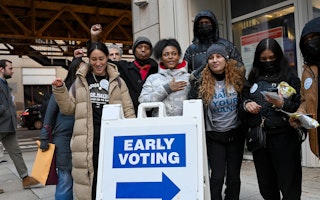AZ Immigration Ruling Endangers Women and Families
By Ai-Jen Poo & Miriam W. Yeung
We breathed a sigh of relief when the Supreme Court blocked some provisions of SB1070, Arizona’s extreme anti-immigrant law. However, despite that victory, we continue to be deeply concerned about the part of the law that the court upheld: section 2(b), which requires law enforcement agents to check the immigration status of anyone they stop for any minor infraction, and who they suspect of being undocumented. Section 2(b) will lead to widespread racial profiling, and will be an enormous setback for the rights of women, families and children.
Our organizations are the co-conveners of an initiative called We Belong Together, which brings together women and youth from all walks of life to call for policies that protect families and communities. We Belong Together has led Women’s Human Rights Delegations to the states that have enacted the most draconian anti-immigrant laws: Arizona, Alabama and Georgia. In all of these states, we have heard from immigrant women whose human rights have been violated, yet who are courageously raising their voices for a society that ensures justice and dignity for all.
Wherever we have traveled, we have seen that laws like SB1070 enable local law enforcement to engage in racial profiling—even when the authors of these policies claim that they can be implemented in a race-neutral manner. We have heard about roadside checkpoints in Latino communities. We’ve heard of Latino drivers being repeatedly pulled over for minor or invented violations. We’ve heard of neighborhoods where residents are stopped almost daily by police who have targeted them. There is no doubt in our minds that in Arizona, Alabama, and Georgia, anti-immigrant laws are legitimizing racial profiling.
The testimonies we have heard illustrate that racial profiling tears families apart. And it violates women’s and children’s basic rights in several fundamental ways:
- Racial profiling violates the right of parents to care for their children. In Alabama, we heard from Trini, who knows she could be pulled over while driving at any moment, and separated from her U.S. citizen children. There are currently over 5,000 children in the foster care system whose parents have been detained or deported.
- Racial profiling violates the right of children to grow up free from fear. In Arizona, we met 10-year-old Catherine who was separated from both of her parents when they were held in immigration detention facilities for three months. We’ve talked with other young people who are consumed by the fear that their parents will be singled out and detained because of the color of their skin.
- Racial profiling violates the rights of women and children to access life-saving health care. In Georgia, we heard from Alicia, whose young daughter has a serious health condition, and who has been pulled over while driving repeatedly by Georgia police, including once when she was taking her daughter to the emergency room. Though her daughter’s life depends on it, Alicia is now afraid to drive.
- Racial profiling violates women’s right to seek protections from domestic violence. In Alabama, we heard from women who are afraid to report sexual assault. We talked with Elvia, a domestic violence survivor who was able to obtain a restraining order before HB56 went into effect, but who knows that if she had waited, her life would still be in danger. Like countless other survivors, she would now be unable to access the justice system for fear of being questioned about her own immigration status.
Racial profiling has a widespread chilling affect, and women and children are the most deeply impacted by these policies. Yet women are also the leading voices for change. As women from all walks of life, it’s up to all of us to demand an end to laws like SB1070, and to ensure that our society will uphold the values of family, inclusion and equal protection for all.
Ai-jen Poo is director of the National Domestic Workers Alliance.
Miriam W. Yeung is executive director of the National Asian Pacific American Women’s Forum.


